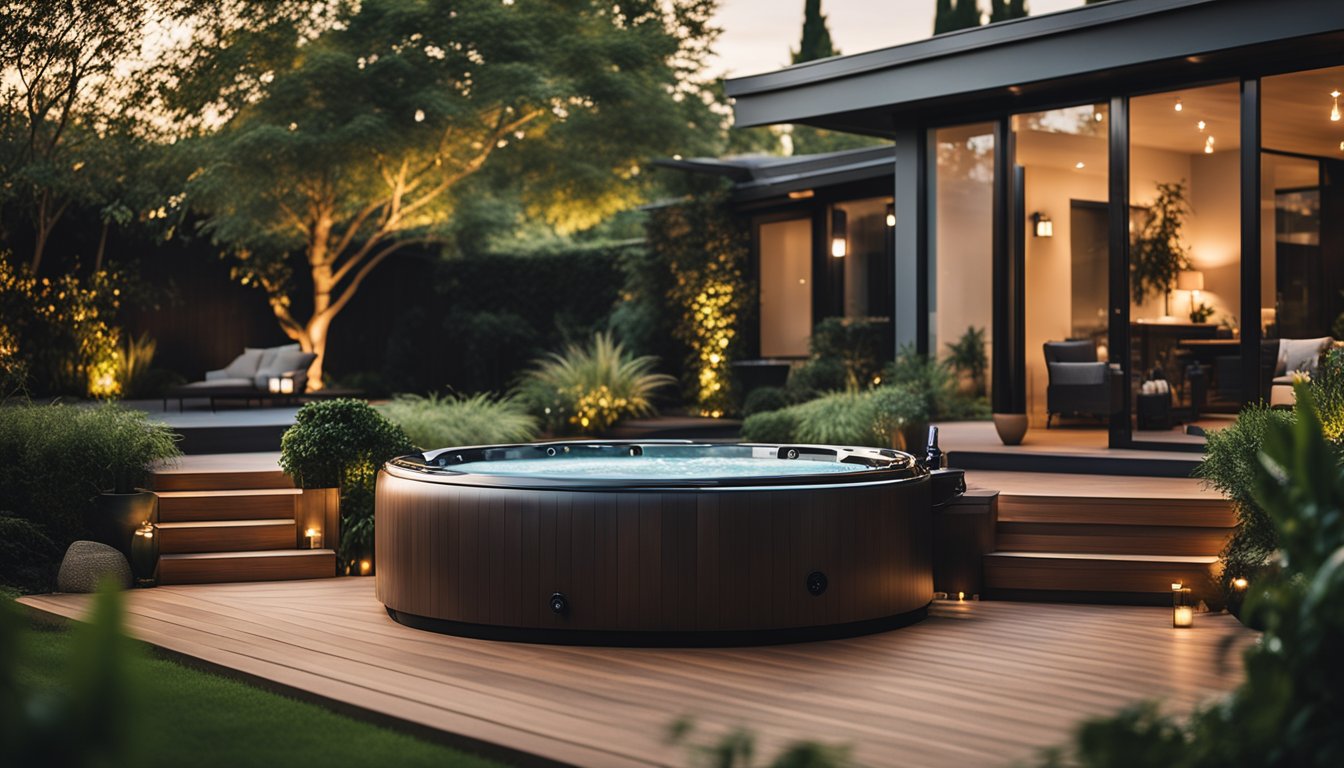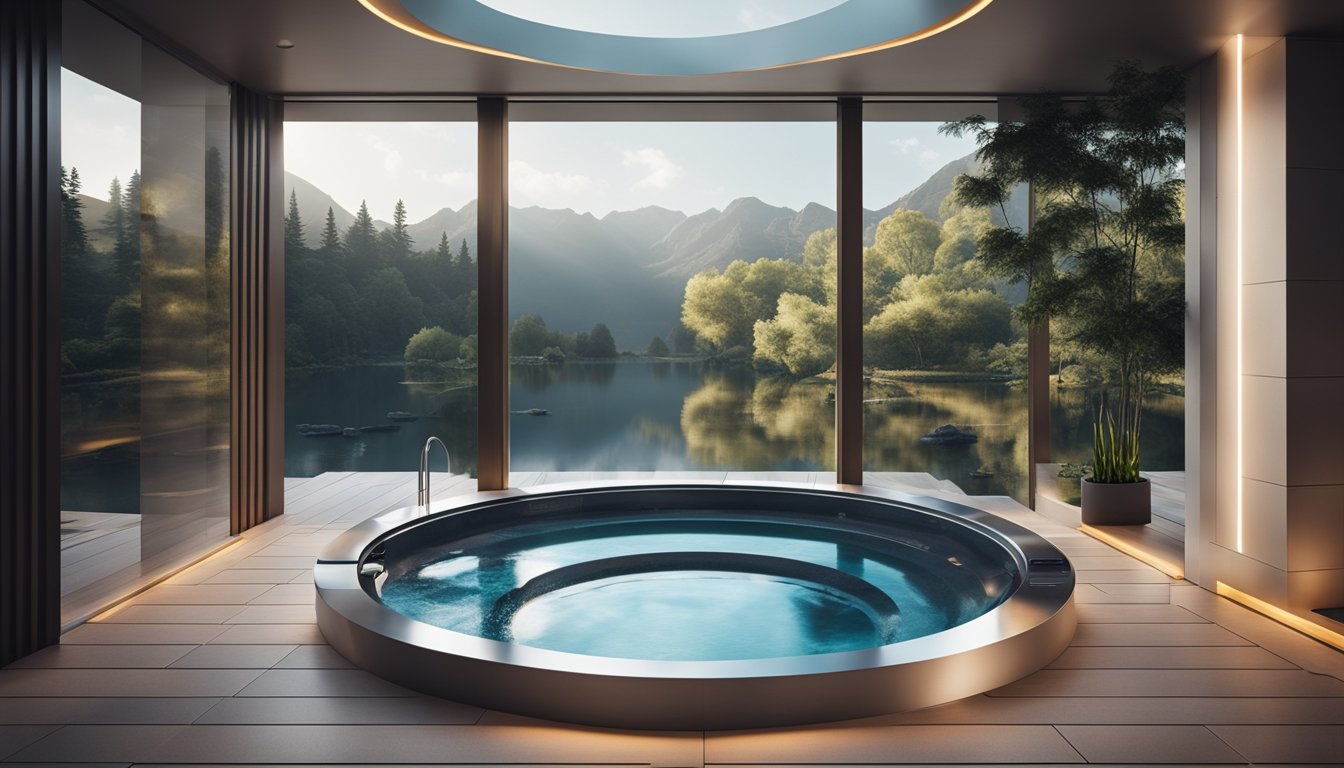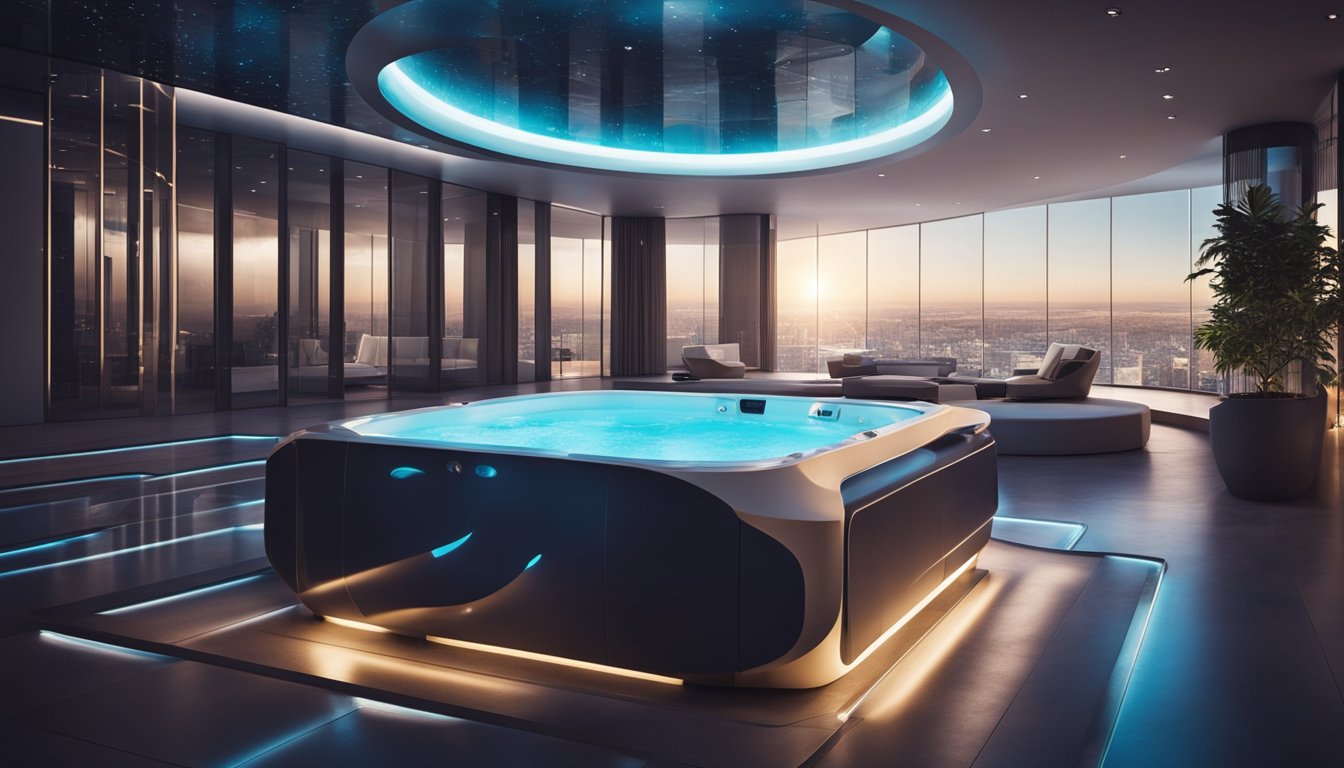Late updated: 23 Dec 2024 09:12
Written by: James Whitaker
Future Trends In Hot Tub Designs: Innovations Shaping Relaxation
As we journey through the evolution of hot tubs, the fusion of cutting-edge design with sustainable practices is captivating the market. Homeowners are eager to transform their outdoor living space into sanctuaries of comfort and style, incorporating hot tubs that reflect personal taste while promoting holistic wellness. With a focus on both aesthetic allure and health benefits, modern hot tub designs are redefining relaxation.

Technological advancements in hydrotherapy are leading this transformation, offering enhanced experiences through innovative features. Today’s hot tubs are far more than just tubs with jets—they are sophisticated, versatile systems designed to cater to our need for rejuvenation and well-being. These advancements in technology facilitate a relaxing and immersive experience.
Our aim is to delve deeper into how personal wellness can be seamlessly integrated into our everyday lives with hot tubs. We are excited to explore these emerging trends, offering insights into the most appealing and functional designs shaping the future of leisure at home.
Key Takeaways
- Modern hot tub designs blend luxury with health benefits.
- Technological innovations enhance holistic wellness experiences.
- Outdoor living spaces transform personal wellness routines.
Innovative Design and Sustainability
As we witness a transformation in hot tub designs, two essential focuses emerge: sustainability and innovation. Eco-friendly materials and energy conservation lead these advancements, while space optimisation and integration with outdoor living enhance modern lifestyles.
Eco-friendly Materials and Energy Efficiency
In the ever-evolving world of hot tubs, the push towards sustainability is spearheaded by the use of eco-friendly materials. Many manufacturers are opting for recycled plastics and sustainable wood sources to minimise environmental impact.
Energy efficiency is also a key consideration in innovative designs. Features like full-foam insulation and energy-efficient pumps drastically reduce energy consumption. Additionally, solar-powered heating systems are becoming increasingly popular, providing a clean energy alternative. These advancements are not merely trends but significant steps towards reducing carbon footprints.
Compact Models and Space Optimisation
As urban living becomes more prevalent, the demand for compact hot tubs that fit into smaller spaces continues to grow. These models offer flexibility and are perfect for city dwellers who still want the luxury of a hot tub without the need for a large garden.
Incorporating built-in seating allows these tubs to maximise available space while providing comfort. With these smartly designed features, more people can enjoy hot tubs even in tight spaces. This commitment to optimising space without compromising on quality or comfort is a testament to the innovation in the industry.
Integration with Outdoor Living Spaces
Finally, hot tubs are becoming integral elements of outdoor living spaces, blending seamlessly with gardens, patios, and decks. This integration encourages a harmonious balance between nature and leisure, enhancing the overall experience.
Our approach often includes using aesthetically pleasing sustainable materials that complement the natural environment. Customisation options allow for personalisation, ensuring that each hot tub fits the user's lifestyle and design preferences. By prioritising aesthetics alongside functionality, we create spaces that are both inviting and environmentally responsible.
Technological Advancements and Hydrotherapy

As we navigate the future of hot tubs, the fusion of cutting-edge technology with hydrotherapy brings profound enhancements. From monitoring systems to advanced therapeutic features, the latest innovations offer a rich and personalised experience.
Smart Technology Integration and Remote Monitoring
Smart technology integration in hot tubs allows users to control settings with ease. With remote monitoring, users can adjust temperature, jet pressure, and lighting from their smartphones. This technological development ensures that the hot tub is ready when needed, offering ultimate convenience.
Bluetooth connectivity adds even more functionality, allowing for seamless music streaming. As a result, waterproof speakers enhance relaxation by perfectly complementing the hydrotherapy experience. Moreover, energy-efficient designs ensure that these modern features do not significantly impact running costs.
Advanced Hydrotherapy Features
Advanced hydrotherapy jets are at the heart of therapeutic innovation in hot tubs. These jets can be strategically adjusted to target specific muscle groups, providing customised relief. Saltwater systems further revolutionise hydrotherapy by delivering a gentler and more natural water care solution, reducing both chemical usage and maintenance.
The flexibility of adjustable jets allows us to optimise our relaxation session. This includes systems that offer varying pressure settings to cater to different preferences and needs. As technology progresses, such features are becoming more refined, offering a therapeutic experience that is as effective as it is luxurious.
Enhancing the Sensory Experience
Enhancing the sensory experience involves integrating various features that engage sight, sound, and touch. Chromotherapy lighting uses different colours to impact mood and relaxation levels, providing an immersive experience. Outdoor lighting options extend usage into the evening, creating a serene, ambient atmosphere.
Modern sound systems are now paired with fire and water features, which offer visual stimulation and an added layer of tranquillity. The interplay of these elements enhances the sensory richness of the hydrotherapy session. Users are enveloped in a multisensory environment where every aspect is tailored to elevate enjoyment and relaxation.
Together, these technological advancements successfully transform hot tubs into holistic wellness destinations, where hydrotherapy is enriched by innovative design and thoughtful integration.
Frequently Asked Questions

As we look forward to the coming years, hot tub design is set to feature innovative trends, energy-efficient features, and sustainable materials. Technological advancements are reshaping model designs, making integration into outdoor spaces both stylish and practical.
What are the emerging design trends for high-end hot tubs?
Emerging design trends for high-end hot tubs include sleek, minimalistic aesthetics and customisable features. Manufacturers are focusing on personalisation, allowing customers to tailor tub designs to fit their preferences and outdoor living spaces.
Which hot tub features are predicted to gain popularity in the upcoming years?
Features such as smart technology integration, including app control and automated maintenance, are on the rise. Additionally, wellness features like hydrotherapy jets and built-in aromatherapy are becoming popular as consumers seek holistic relaxation experiences.
What should consumers look for when seeking energy-efficient hot tub models?
Energy efficiency is becoming a top priority for consumers. Look for models with enhanced insulation, efficient water circulation systems, and energy-efficient heaters. Adjustable jet speeds and timers can also help conserve energy, making hot tubs more environmentally friendly.
How are advancements in technology influencing new hot tub designs?
Advancements in technology are leading to the incorporation of more intuitive controls and user-friendly interfaces. Features such as LED lighting, Bluetooth speakers, and remote monitoring systems are being integrated, enhancing both convenience and entertainment value.
What materials are becoming more prevalent in eco-friendly hot tub manufacturing?
Sustainable materials are gaining traction. Manufacturers are using recycled composites, eco-friendly fibreglass, and renewable timbers for construction. These materials not only reduce environmental impact but also contribute to the durability and aesthetics of the tub.
In what ways can homeowners integrate hot tubs into outdoor living spaces stylishly?
Stylish integration can be achieved by incorporating hot tubs into decks or patios with complementary landscaping. Using elements like pergolas, privacy screens, and built-in seating can create an inviting atmosphere that seamlessly blends the hot tub into the outdoor environment.
